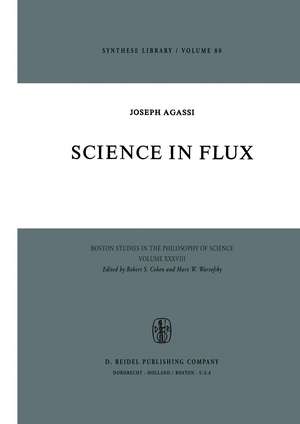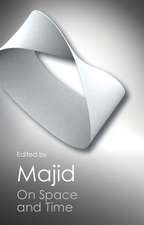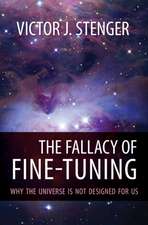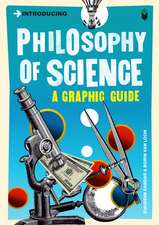Science in Flux: Boston Studies in the Philosophy and History of Science, cartea 28
Autor J. Agassien Limba Engleză Hardback – 31 aug 1975
| Toate formatele și edițiile | Preț | Express |
|---|---|---|
| Paperback (1) | 1225.28 lei 6-8 săpt. | |
| SPRINGER NETHERLANDS – 31 aug 1975 | 1225.28 lei 6-8 săpt. | |
| Hardback (1) | 1232.54 lei 6-8 săpt. | |
| SPRINGER NETHERLANDS – 31 aug 1975 | 1232.54 lei 6-8 săpt. |
Din seria Boston Studies in the Philosophy and History of Science
- 18%
 Preț: 944.19 lei
Preț: 944.19 lei - 15%
 Preț: 646.75 lei
Preț: 646.75 lei - 15%
 Preț: 646.75 lei
Preț: 646.75 lei - 15%
 Preț: 699.28 lei
Preț: 699.28 lei - 18%
 Preț: 736.50 lei
Preț: 736.50 lei -
 Preț: 500.01 lei
Preț: 500.01 lei - 15%
 Preț: 643.16 lei
Preț: 643.16 lei - 15%
 Preț: 650.69 lei
Preț: 650.69 lei - 15%
 Preț: 634.18 lei
Preț: 634.18 lei - 15%
 Preț: 642.68 lei
Preț: 642.68 lei -
 Preț: 391.40 lei
Preț: 391.40 lei -
 Preț: 383.33 lei
Preț: 383.33 lei - 18%
 Preț: 944.19 lei
Preț: 944.19 lei - 18%
 Preț: 955.56 lei
Preț: 955.56 lei - 15%
 Preț: 643.65 lei
Preț: 643.65 lei -
 Preț: 392.75 lei
Preț: 392.75 lei - 18%
 Preț: 1229.10 lei
Preț: 1229.10 lei - 18%
 Preț: 1238.23 lei
Preț: 1238.23 lei - 18%
 Preț: 951.29 lei
Preț: 951.29 lei - 18%
 Preț: 1223.25 lei
Preț: 1223.25 lei - 18%
 Preț: 1225.79 lei
Preț: 1225.79 lei - 18%
 Preț: 1226.42 lei
Preț: 1226.42 lei - 18%
 Preț: 1236.82 lei
Preț: 1236.82 lei - 15%
 Preț: 644.49 lei
Preț: 644.49 lei - 18%
 Preț: 1231.78 lei
Preț: 1231.78 lei - 15%
 Preț: 644.30 lei
Preț: 644.30 lei - 18%
 Preț: 957.62 lei
Preț: 957.62 lei - 18%
 Preț: 1222.49 lei
Preț: 1222.49 lei - 18%
 Preț: 947.50 lei
Preț: 947.50 lei - 18%
 Preț: 1833.95 lei
Preț: 1833.95 lei - 18%
 Preț: 1227.99 lei
Preț: 1227.99 lei - 18%
 Preț: 947.35 lei
Preț: 947.35 lei
Preț: 1232.54 lei
Preț vechi: 1503.10 lei
-18% Nou
Puncte Express: 1849
Preț estimativ în valută:
235.84€ • 246.90$ • 195.15£
235.84€ • 246.90$ • 195.15£
Carte tipărită la comandă
Livrare economică 05-19 aprilie
Preluare comenzi: 021 569.72.76
Specificații
ISBN-13: 9789027705846
ISBN-10: 9027705844
Pagini: 590
Ilustrații: XXVI, 559 p.
Dimensiuni: 155 x 235 x 37 mm
Greutate: 1.03 kg
Ediția:1975
Editura: SPRINGER NETHERLANDS
Colecția Springer
Seria Boston Studies in the Philosophy and History of Science
Locul publicării:Dordrecht, Netherlands
ISBN-10: 9027705844
Pagini: 590
Ilustrații: XXVI, 559 p.
Dimensiuni: 155 x 235 x 37 mm
Greutate: 1.03 kg
Ediția:1975
Editura: SPRINGER NETHERLANDS
Colecția Springer
Seria Boston Studies in the Philosophy and History of Science
Locul publicării:Dordrecht, Netherlands
Public țintă
ResearchCuprins
1. A Prologue: On Stability and Flux.- References.- 2. Science in Flux: Footnotes to Popper.- I. Einstein has Upset the View that Science is Stable.- II. The Empirical Support of Some Scientific Theories Requires Explanation.- III. The Desire for Stability Makes Us See More of It than There is.- IV. Popper’s Theory Presents Science as an Endless Series of Debates.- V. Popper Makes Additional Assumptions.- VI. Rationality is a Means to an End.- References.- Appendix: The Role of Corroboration in Popper’s Philosophy.- Notes.- 3. On Novelty.- I. On the Novelty of Ideas in General.- II. Science and Truth.- III. Popper’s View of Science.- Notes.- Appendix: On the Discovery of General Facts.- 4. Replies To Diane: Popper On Learning From Experience81.- Note.- Appendix: Empiricism Without Inductivism.- 5. Sensationalism.- 1. Sensationalism vs. Theoretical Knowledge.- 2. Sensationalism vs. Empiricism.- 3. Sense-Experience vs. Experience.- 4. Sensationalism vs. Common Sense.- 5. Explanation vs. Consent.- 6. The Roots of Scientific Realism.- 7. Conclusion.- 6. When Should we Ignore Evidence in Favour of a Hypothesis?.- I. Can Observation Reports be Revoked?.- II. Can Refutation be Final?.- III. A Simple Issue Obfuscated.- IV. A Criterion for Rejection of Observation Reports?.- V. Does Popper Offer a Rule of Rejection?.- VI.Do We Need a Rate of Acceptance of Observation Reports?.- Appendix: Random Versus Unsystematic Observations.- 7. Testing as a Bootstrap Operation in Physics.- First Introduction: Reliability is not a Matter for Pure Science.- Second Introduction: The Duhem-Quine Thesis has a New Significance.- I. Conventionalists and the Problem of Induction.- II. Popper is Ambivalent Regarding Goodman’s Problem.- III. Bootstrap Operations in Testing.- IV. The Need forConstraints is Quite Real.- V. Science Constraints Itself by Auxiliary Hypotheses.- VI. Revolutions Occur when Bootstrap Operations Fail.- VII. Conclusion.- Appendix: Precision in Theory and in Measurement.- 8. Towards A Theory Of ‘Ad Hoc’ Hypotheses.- I. Ad hoc Hypotheses which become Factual Evidence.- II. The Conventional Element in Science.- III. Reducing the Conventions.- IV. Metaphysics and ad hoc Hypotheses.- V. What is a Mess?.- Appendix: The Traditional ad hoc Use of Instrumentalism.- 9. The Nature of Scientific Problems and their Roots in Metaphysics.- I. Scientific Research Centers Around a Few Problems.- II. The Anti-Metaphysical Tradition is Outdated.- III. A Historical Note on Science and Metaphysics.- IV. Pseudo-Science is not the Same as Non-Science.- V. Popper’s Theory of Science.- VI. Superstition, Pseudo-Science, and Metaphysics Use Instances in Different Ways.- VII. Metaphysical Doctrines are Often Insufficient Frame-works for Science.- VIII. The Role of Interpretations in Physics.- IX. The History of Science as the History of Its Metaphysical Frameworks.- Appendix: What is a Natural Law?.- 10. Questions of Science and Metaphysics.- I. How Do we Select Questions?.- II. We Select Questions Within Given Metaphysical Frame-works.- III.The Literature on Questions.- IV.The Literature on the Logic of Questions.- V.The Instrumentalist View on the Choice of Questions.- VI. Collingwood’s Peculiarity.- VII. The Logic of Multiple-Choice-Questions.- VIII. Bromberger on Why-Questions.- IX. The Need for a Metaphysical Theory of Causality.- X.Collingwood in a New Garb.- Appendix: The Anti-Scientific Metaphysician.- Notes.- 11. The Confusion Between Physics And Metaphysics in the Standard Histories of Sciences.- Appendix: Reply to Commentators.- 12.TheConfusion Between Science and Technology in the Standard Philosophies of Science.- Appendix: Planning for Success: A Reply to Professor Wisdom.- Notes.- 13. Positive Evidence in Science and Technology.- I. Kant’s Scandal.- II. Whitehead’s Scandal.- III.The Facts About Induction.- IV.Success and Rationality.- V. The Sociology of Knowledge.- Appendix: Duhem’s Instrumentalism and Autonomism.- 14. Positive Evidence as a Social Institution.- Appendix: The Logic of Technological Development.- 15. Imperfect Knowledge.- I. Equating Imperfect Knowledge with Science is Questionable.- II. Equating Imperfect Knowledge with Rational Belief is an Error.- III. Imperfect Knowledge-Claims are Qualified by Publicly Accepted Hypotheses.- Notes.- 16. Criteria for Plausible Arguments.- Note.- Appendix: The Standard Misinterpretation of Skepticism.- 17. Modified Conventionalism.- I. The Problem.- II. Science and Society.- III. Popper’s Problems of Demarcation.- IV. The Three Views Concerning Human Knowledge Revisited.- Appendix: Bartley’s Critique of Popper.- Notes.- 18. Unity and Diversity in Science.- Abstract.- I. Ambivalence Towards Unity: An Impression.- II. The Ethics of Science as a Unifier of Science.- III. Proof as the Unifier of Science.- IV. Manifest Truth as the Unifier of Science.- V. Unity of Science as a Dictator of Unanimity on All Questions.- VI. A Theory of Rational Disagreement.- References.- Appendix on Kant.- 19. Can Religion go Beyond Reason?.- I. Religion and Reason.- II. Dissatisfaction with Science and Religion.- III. Reason and Faith.- IV. The Question of Complementary Relationship.- V. Toward Intellectual Complementation.- VI. Possibilities of Cooperation.- VII. Defects of Both Rationalism and Religion.- VIII. Standards of Rational Thought and Action.-IX. Enlightenment and Self-Reliance.- X. The Sophisticated Religionists: Buber and Polangi.- XI. Science and Universalistic Religion.- Notes.- Appendix on Buber.- 20. Assurance and Agnosticism.- I. The Compleat Agnostic.- II. The Image of Inductive Science.- III. Empirical Facts About Assurance.- IV. The Non-Justificationist Mood.- V. Conversion to Autonomism.- VI. The Assured Agnostic.- Index of Works Cited.- Index of Names.- Index of Subjects.













